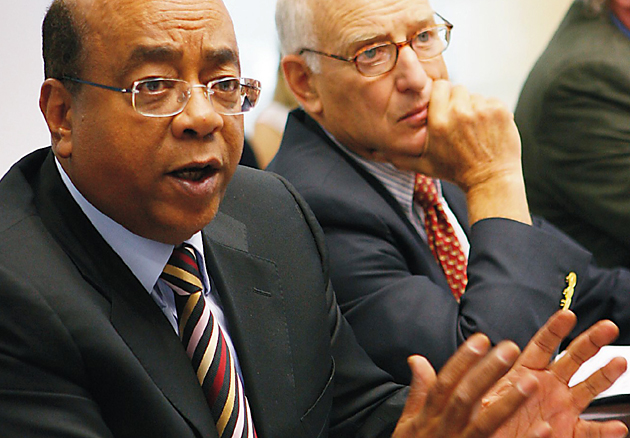Judges for the Mo Ibrahim Foundation's annual $5 million prize for good governance in Africa decided to skip the award this year. And although no one is telling why, it must be that after Botswana's Festus Mogae won it last year, there wasn't anybody anywhere else on the continent who deserved to be set up with a nice retirement package.
The prize for achievement in African leadership is described as the largest individual annual award in the world, with the winner getting five million big ones over 10 years, plus $200,000 a year for life thereafter. The booty goes to a democratically elected former leader from a sub-Saharan African country who has voluntarily left office in the last three years.
The fact that it is said to be the biggest prize of its kind says a lot about the state of African governance, and the kind of incentives Sudanese-born businessman Mo Ibrahim, after whom the foundation is named, thinks are needed to stamp out endemic violence and corruption. Former president of Botswana, Ketumile Masire, who is on the prize committee, said it could not select a winner, even after lengthy deliberations. This despite some 11 African leaders having left office in 2006, 2007 or 2008, including Thabo Mbeki of South Africa (perhaps not all that voluntarily) and Olusegun Obasanjo of Nigeria.
As an award for excellence, we reckon Mbeki was definitely not in the running. Whether over Aids denialism, Jackie Selebi, Bob Mugabe, wholesale abuse of the organs of state, or a million other reasons. Ibrahim, being a good democrat, says he abides by the rules of the prize committee, and that members draw their own conclusions. The head of the committee is former UN chief Kofi Annan, while other members include Mohamed ElBaradei, head of the International Atomic Energy Agency, and former Irish president Mary Robinson.
The award was first given in 2007 to former Mozambican president Joaquim Chissano, and our own Nelson Mandela is an honorary laureate. But this time around, it seems the prize committee had only noted progress in some countries, while “noting with concern” setbacks in others. Maybe the 2009 award should have gone to Morgan Tsvangirai, who gave up power so quickly he never had it to start with and missed out on the Nobel Peace Prize. But one can reckon that the prize committee would rather have him fighting Mugabe on the front benches, than have him sitting drinking pina coladas in the Seychelles for the rest of his life.
By Mark Allix



















 Become an Insider
Become an Insider